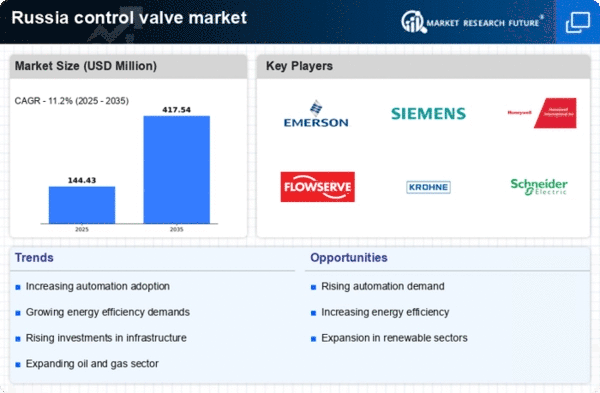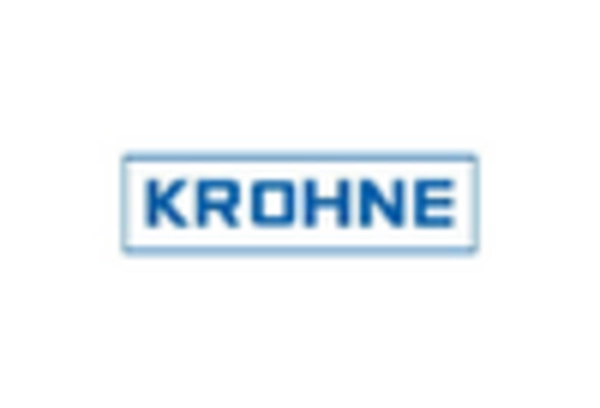Increasing Industrial Automation
The control valve market in Russia is experiencing a notable surge due to the increasing trend of industrial automation across various sectors. Industries such as oil and gas, chemicals, and power generation are increasingly adopting automated systems to enhance operational efficiency and reduce human error. This shift is likely to drive demand for advanced control valves, which are essential for precise flow regulation and process control. According to recent data, the automation market in Russia is projected to grow at a CAGR of approximately 8% over the next five years, indicating a robust demand for control valves. As industries seek to optimize their processes, the control valve market is poised to benefit significantly from this trend, reinforcing its importance in the industrial landscape.
Growth of Renewable Energy Sector
The growth of the renewable energy sector in Russia is emerging as a pivotal driver for the control valve market. As the country seeks to diversify its energy sources and reduce reliance on fossil fuels, investments in wind, solar, and hydroelectric power are increasing. Control valves are crucial in managing the flow of fluids in renewable energy systems, ensuring optimal performance and efficiency. The Russian government has set ambitious targets for renewable energy, aiming for a 4.5% share of the total energy mix by 2024. This shift towards renewable energy is likely to stimulate demand for advanced control valves, as industries adapt to new technologies and processes. The control valve market stands to gain significantly from this transition, reflecting the broader trends in energy sustainability.
Investment in Infrastructure Development
The ongoing investment in infrastructure development in Russia is a significant driver for the control valve market. Major projects in transportation, energy, and water management are underway, necessitating the use of control valves for effective flow management and system regulation. The Russian government has allocated substantial funding for infrastructure projects, with an estimated budget of over $100 billion for the next five years. This investment is likely to create a robust demand for control valves, as they are essential components in various infrastructure applications. The control valve market is expected to benefit from this influx of investment, as industries seek to enhance their operational capabilities and ensure the reliability of their systems.
Regulatory Compliance and Safety Standards
In Russia, stringent regulatory compliance and safety standards are becoming increasingly critical for industries, particularly in sectors such as oil and gas and chemical processing. The control valve market is directly impacted by these regulations, as control valves play a vital role in ensuring safe and efficient operations. Compliance with safety standards necessitates the use of high-quality control valves that can withstand extreme conditions and prevent leaks or failures. The Russian government has implemented various regulations aimed at enhancing industrial safety, which is likely to drive the demand for reliable control valves. As industries strive to meet these compliance requirements, the control valve market is expected to see a steady increase in demand, reflecting the growing emphasis on safety and regulatory adherence.
Technological Innovations in Control Systems
Technological innovations in control systems are significantly influencing the control valve market in Russia. The integration of smart technologies, such as IoT and AI, into control systems is enhancing the functionality and efficiency of control valves. These innovations allow for real-time monitoring and predictive maintenance, which can lead to reduced downtime and improved operational efficiency. As industries increasingly adopt these advanced technologies, the demand for sophisticated control valves that can integrate with modern control systems is likely to rise. The control valve market is expected to evolve in response to these technological advancements, positioning itself as a critical component in the future of industrial automation and process control.
















